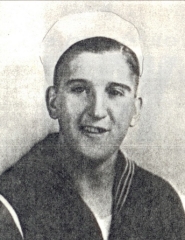Daniel F. Sander

Daniel F. Sander
DANIEL
F.
SANDER
SOLDIER DETAILS
BIOGRAPHY
Dan, barely finished growing up on a farm near Walker, found himself floating in diesel fuel and ocean water after his ship sunk off Okinawa. He was in the gun turret of his ship when a kamikaze flying low over the water headed straight for the side of the ship below the turret. At first, the 9 men in the turret were trapped. Finally able to escape, they waded through water up to their knees, put on life jackets, and jumped off the ship. 'Our ship went down. In 7 minutes, it was completely gone.' Their delay in getting out of the turret contributed to their survival. The ship, struck near the rear, filled with water in the aft portion and lifted vertical with the bow in the air before sinking straight down. As the ship sunk, water pressure set off the ammunition; the resulting concussion in the water sent a shock wave that injured many of the seamen who had made quicker escapes from the sinking ship and were further out in the water. Sharks, drawn by the blood of the injured seamen, attacked them, leaving the uninjured alone. Sharks weren't the only thing the survivors had to worry about, 'Those Japs still strafed us. They flew over us and fired---boop, boop, boop.' The destroyers and both LSMRs were sunk that day. 'If it wouldn't have been for the LCIs, we wouldn't have survived. There were a lot of survivors out there to be picked up.' In the water an hour and a half before being plucked out, he bobbed in a pool of spilled diesel fuel. The two LCIs, the smallest ships in the group, spent the entire day picking survivors out of the water before heading back to Okinawa at nightfall. 'There were so many survivors we all had to stand up. Only the wounded ones got to sit down on a bed.' He still has the prayer book he carried like a talisman throughout his time in the Navy. He had no explanation for how the book, in his pocket that day while he floated in the ocean, survived unscathed. The staples are a tinge rusted, but otherwise the book remains readable 60 years after his ordeal. The Battle of Okinawa, destined to be the final battle of WWII, spanned 82 days. The naval fleet at Okinawa was the largest armada ever assembled by the US (his ship was part of the front line). 'April 1, 1945, that's when we attacked Okinawa. We lined up side by side, the 12 ships, and we moved into the beach. When we got close enough, they fired all those rockets---the ships. I don't know how many ships were behind us.' An important part of Japanese strategy during the battle for Okinawa was attack by the suicide pilot force known as the 'Divine Wind'---the kamikaze. Dan, drafted at age 20 and inducted in Kansas City on June 2, 1944, didn't get any choice about serving in the military. He did get a say in which branch. 'I had a choice, so I took the Navy.' After boot camp and training, Dan was sent to New York City to learn to be a gunner and spent time in Virginia Beach, VA., before being sent to Charleston, SC, where he was assigned to LSMR-194. It was a medium-sized amphibious ship designed to fire rockets from the sea. On Dec. 4, 1944, they sailed out of Charleston, headed for the Panama Canal. A week later, passing through the canal, they headed for San Diego, arriving Christmas Eve of 1944. They then sailed to Pearl Harbor, and arrived in Okinawa in late March. A few days after his rescue, he was taken to San Francisco, received a month's leave and went home to visit family. Finishing his duty in CA, he was discharged in June 1946, and returned to his family's farm. He married Alexia Schmidt on Oct. 20, 1947. They moved to Hays, Kansas, in 1955 and had three daughters and a son. She died on Oct. 25, 1992. He retired from ranching and maintenance work in 1986 and worked at a grocery store until 1998. He married Ann Sanders Kreutzer on May 28, 1999. Now 85, he still clearly remembers the cold of the water and the smell of the diesel fuel on that day off the shore of Okinawa. 'There were 65 suicide planes,' Sander said. 'We didn't have a chance'
 Eisenhower Foundation
Eisenhower Foundation
